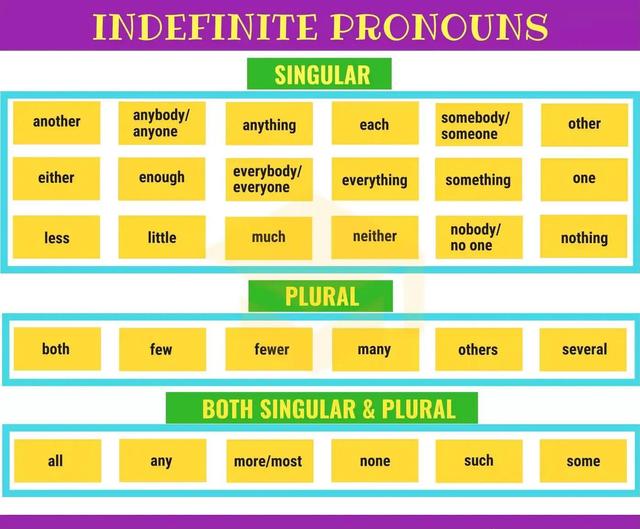
不定代词,是英语语法术语,在句中可以作主语、宾语、表语、定语和状语。不定代词是不指明代替任何特定名词或形容词的代词。

An indefinite pronoun is a pronoun which does not have a specific familiar referent. Indefinite pronouns are in contrast to definite pronouns. Indefinite pronouns can represent either count nouns or noncount nouns. They often have related forms across these categories: universal (such as everyone, everything), assertive existential (such as somebody, something), elective existential (such as anyone, anything), and negative (such as nobody, nothing).
不定代词是没有特定的熟悉指代物的代词。不定代词与定代词形成对比。不定代词既可以表示计数名词,也可以表示非计数名词。它们通常在这些类别中有相关的形式:普遍的(比如每个人,每件事)、肯定的存在(比如某人,某件事)、选择性的存在(比如任何人,任何事)和否定的(比如没有人,什么都没有)。

(1)some,any和no
1* some 和 any都有“一些”的意思;no表示“没有”的意思。 some 通常用于肯定句中, any 用于否定句或疑问句中。
例: There are some apples on the table. (桌子上有一些苹果。)
例: I don't have any questions. (我没有问题。)
2* no用在肯定句中表示否定的意思,相当于 not any 或 not a/an。不定代词no 通常只可以作定语。
例: I have no money. (我没有钱。)

(2)some, any和no构成的复合不定代词
不定代词 some,any,no与one,body,thing 可以构成复合不定代词,用法也分别与 some,any,no 的用法相同。someone/ somebody(某人),anyone/anybody(任何人),no one/nobody(没有人)指人;something(某事/物),anything(任何事/物),nothing(没有事/物)指物。
例: Is there anyone at home? (有人在家吗?)
例: Nobody knows the answer. (没有人知道答案。)

(3)every和each
1* every 表示各个,用于三者或三者以上,含有“全部”的意味,谓语动词用单数形式。
例: Every child is very clever.(每个孩子都很聪明。)
2* each用于两者或两者以上,含有"各自”的意味,指整体中的个别人或事物,谓语动词要用单数形式。
例: I gave each boy a football. (我给了每个男孩一个足球。)
(4)both, all
1* both表示“两者都”,其后谓语动词用复数形式。
例: Both of the girls like dancing.(这两个女孩都喜欢跳舞。)
2* all 表示“三者或三者以上都”,后接复数名词时,谓语动词用复数形式;后接不可数名词时,谓语动词用单数形式。
例: All of the students are in the playground.
(所有的学生都在操场上。)
例: All of my money is lost. thevase.(不是你就是 我所有的钱都丢了。)

(5) either 和 neither
1* either 表示“两者中任何一个”,其后谓语动词用单数形式。
例: Either of the two boys is clever.(两个男孩中的任何一个都聪明。)
2* neither 表示“两者都不”,其后谓语动词用单数形式。
例: Neither story is interesting. (两个故事都没有意思。)

(6)many/much, a few/a little, few/little
1* many 和 much 都有“许多,大量”的意思。many 后面接可数名词复数,much 后面接不可数名词。
例: Lucy has many different stamps.(露西有很多不同的邮票。)
例:I have too much homework to do.( 我有太多作业要做。)
2* a few 和 a little 都有“少量”的意思。a few 后面接可数名词复数,a little 后面接不可数名词。
例: Only a few boys can read. (只有几个小男孩会读。)
例: He has a little food. (他有一点儿食物。)
3* few 和 little 都有“几乎没有”的意思。few后面接可数名词复数,little 后面接不可数名词。
例: I have few friends. (我几乎没什么朋友。)
例: Hurry up! There's little time left. (快点儿!没有时间了。)








